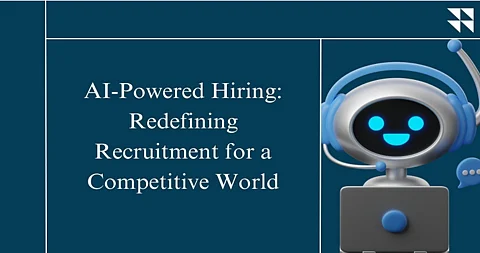

Extensive research into the transformative potential of artificial intelligence (AI) in recruitment highlights a robust framework for leveraging technology to modernize hiring processes. Rekha Kota’s insights underscore the tangible benefits of AI in building efficient, unbiased, and data-driven recruitment systems. These advancements pave the way for smarter, faster, and more inclusive hiring, addressing operational and ethical challenges in the evolving talent acquisition landscape.
AI has redefined recruitment by turning labor-intensive processes into efficient systems. Repetitive tasks, such as resume screening and initial assessments, are now automated, enabling recruiters to prioritize strategic decision-making. Organizations using AI report a 30-40% reduction in time-to-hire, allowing them to respond quickly to dynamic talent market needs.
Predictive analytics is another game-changing feature of AI in recruitment. By analyzing vast datasets, these systems predict candidate performance based on skills, experience, and behavioral traits. This reduces guesswork and bias, ensuring a more accurate match between candidates and roles compared to traditional methods.
AI recruitment technologies benefit companies by rethinking their entire recruiting process not only at the initial screening stage. AI systems make every step of the hiring process work faster and smoother. Companies using AI recruitment programs cut their hiring costs by 23% because the systems do tasks automatically and provide precise results. Natural language processing technology reviews large groups of resumes in short periods thanks to its 85% success rate at finding the best suited candidates for job positions.
Automated systems help prevent mistakes during work procedures. Our team now enters fewer data errors by 85% which makes our hiring process better. These systems show us where our processes get stuck and allow us to improve our work practices so we can do better every time.
Advance Diversity and inclusion continue to trouble organizations in hiring processes but AI tools find ways to solve these problems. AI evaluation systems eliminate human judgment because they evaluate only skills and abilities of candidates. Employers have achieved greater workplace diversity as their bias detection systems now drive 15 percent better representation of talent. The system needs ongoing ethical assessment and fairness checks to stop serving biased results while keeping all systems visible.
AI complements human decision-making rather than replacing it. Automating tasks like screening and interview scheduling allows recruiters to concentrate on engaging top talent and making strategic decisions. This collaboration improves decision accuracy by 73%, combining human intuition with AI’s analytical strengths. User-friendly dashboards enhance this partnership by providing actionable insights, enabling recruiters to make better-informed choices while maintaining control. The result is a hiring process that blends technological efficiency with human expertise.
While AI transforms recruitment, its implementation must prioritize ethics, transparency, and fairness. Regular algorithm audits are essential to identify and correct biases. Candidates must be informed about AI’s role in the process and allowed to contest decisions when needed. Upholding ethical principles is vital to building trust and fostering inclusivity. For AI to succeed in recruitment, it must go beyond efficiency to ensure fairness and equity in every step.
AI’s role in recruitment is set to become even more sophisticated. Advanced systems will provide deeper insights into candidate potential, integrating behavioral and cultural fit analyses to align hiring with organizational goals.
Future AI platforms will also merge with other HR technologies, creating seamless ecosystems for talent management. By analyzing data across the employee lifecycle, organizations can refine hiring practices, improve retention rates, and gain a competitive edge in the talent market.
Rekha Kota’s research provides a blueprint for navigating the future of recruitment. By thoughtfully adopting AI innovations, organizations can build faster, smarter, and more inclusive hiring processes. This approach balances efficiency with fairness, helping businesses thrive in the ever-evolving world of talent acquisition.
